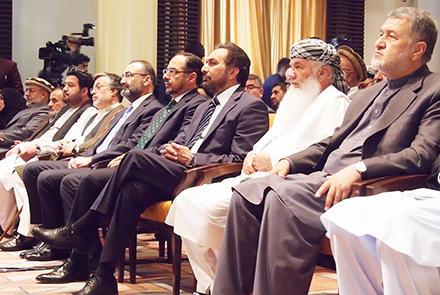Jamiat-e-Islami party of Afghanistan and the presidential palace (ARG) have reached an agreement on at least seven demands out of twelve tabled to government by the party in their bid to break the ongoing stalemate, according to information obtained by TOLOnews.
In the draft agreement of the National Unity Government and Jamiat-e-Islami, the demands are described as follows:
• Establishment of a constitution amendment commission based on the political agreement of the National Unity Government (NUG)—in response to this, the government has agreed to create such a commission in the near future and the commission will propose the necessary amendments in the constitution within six months.
• Considering amendments in the election law and giving share to the political parties in the national assembly before next year’s elections—the two sides have not agreed on this issue.
• The re-election of members of the election commissions, but the two sides have not agreed on it, however they have agreed to bring about the necessary reforms in the election commissions.
• Both sides have agreed on holding the elections as per schedule this year.
• Holding the constitutional amendment Loya Jirga after the parliamentary and district council elections and before the presidential elections, but the two sides have agreed that if the preconditions are implemented completely, the Loya Jirga can be held after the presidential elections.
Jamiat-e-Islami says that the party has not reached any kind of settlement with the presidential palace’s negotiators about the rolling out process of electronic ID cards.
• Giving share of Jamiat-e-Islam in the national unity government based on the NUG political agreement—the government has agreed that Balkh governor and police chief must be determined on the basis of a recommendation by Jamiat-e-Islami. Negotiations were also held on two ministries, but talks were not held on certain candidates who will occupy the two ministries.
• Providing clear information about the nature of the attack on the funeral ceremony of Salem Ezedyar. The special commission which was tasked to investigate the incident will brief Jamiat about the attack, if Jamiat is not satisfied about the outcomes, the investigations will continue.
• The two sides have agreed to the establishment of a High Council of Political Parties.
• The two sides also agreed to create a joint commission to oversee the implementation of the agreement between the government and Jamiat-e-Islami within the framework of a specific timeline.
• Extension of the tenure of Atta Mohammad Noor as governor of Balkh until ARG and Jamiat-e-Islami reach a final settlement—the two sides agreed that if key items of the proposals are accepted by government, in this case, Noor will step down from his post.
• Jamiat has proposed the overseeing of the agreement by the US ambassador to Afghanistan and UN delegation, something the government rejected. But Jamiat has asked the president to give assurance about the agreement at a press conference.
It appears however that there are still serious challenges ahead for both parties before they can reach a final agreement.
On Thursday, the US Ambassador to Kabul John R. Bass called for an urgent solution to be found to end the ongoing dispute between government and ousted Balkh governor Atta Mohammad Noor, who was fired last month by President Ashraf Ghani.
He said this dispute was an Afghan issue and needed to be dealt with accordingly. He said it was not an issue for the US or any other foreign country to resolve. It was an Afghan problem that needed to be resolved within the framework of the Constitution and in accordance with rule of law.
Vice President Mike Pence spoke with President Ashraf Ghani of Afghanistan by phone on Tuesday 16 January and emphasized his support for the Afghan government to engage with Noor and conduct a peacefully negotiated transition of leadership.
According to a White House statement the discussion was a continuation of the dialogue that the Vice President had with Ghani and Chief Executive Abdullah in Kabul last month.
Pence highlighted Kabul’s continued engagement and critical progress on necessary reforms, political inclusion, and preparations for forthcoming elections.

